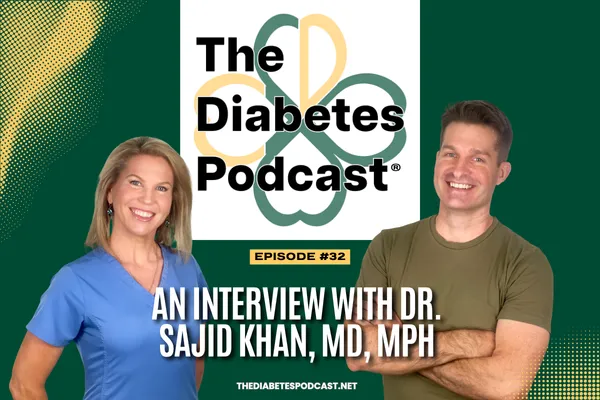
EP032: Insulin Therapy for Type 2 Diabetes with Dr Sajid Khan
Insulin Therapy for Type 2 Diabetes with Dr. Sajid Khan, MD, MPH
“Insulin is a natural hormone and often the best option for people who can’t tolerate other meds.”
Welcome to The Diabetes Podcast blog. In this episode recap, we sit down with Dr. Sajid Khan, MD, MPH—an endocrinology‑focused family medicine physician with 15+ years helping people manage diabetes, thyroid disease, and metabolic health. He trains patients and clinicians on CGMs and insulin pumps, and he is certified for Eversense CGM insertion.
We talked about insulin therapy for type 2 diabetes, why technology matters, and how to prevent long‑term complications. If you’ve wondered whether an insulin pump or CGM is worth it, or how to discuss insulin without stigma, this is for you.
Why Dr. Khan leans into technology
Diabetes can feel like a part‑time job. Tech can reduce the daily burden.
Automated insulin delivery (AID) adjusts insulin in real time. That means fewer dosing errors than with manual shots.
Tubeless pumps like Omnipod remove tubing, are shower- and swim‑friendly, and fit into busy lives.
CGMs turn numbers into guidance. You can make daily decisions with confidence.
What’s new: Pumps for type 2 diabetes
Omnipod and other pumps were once mainly for type 1. Now pumps are approved for type 2 diabetes as well.
In Dr. Khan’s clinic, moving from multiple daily injections to pumps has improved ease, safety, and results.
He aims to move almost every insulin‑using patient off manual shots and onto automated systems, in line with ADA guidance.
Insulin therapy for type 2 diabetes: when and why
Insulin is a natural hormone. For people who can’t tolerate other meds or have side effects, insulin is often the right choice.
Dr. Khan is not “pro‑insulin at all costs.” He uses GLP‑1 receptor agonists and SGLT2 inhibitors when possible because they help protect the heart and kidneys and can reduce insulin needs.
When insulin is needed, pumps help deliver it safely and consistently.
How pumps make life easier—for patients and clinicians
Shots can mean complex instructions: different doses at different times, and lots of room for error.
Pumps automate dosing and reduce prescription confusion.
AID systems work with CGMs to prevent highs and lows throughout the day and night.
CGMs: more than data
CGMs show trends, not just single readings.
They help match meals, movement, sleep, and meds to your blood sugar patterns.
Pairing CGMs with the right meds can change outcomes, not just numbers.
Talking about insulin without stigma
Some people fear insulin means “I failed.” Dr. Khan pushes back on that.
Every person is different. The goal is to prevent complications, not to “win” by avoiding insulin.
If insulin is needed, using the pump can make it simpler and safer.
Preventing complications is the real goal
Targets: protect heart, kidneys, eyes, and feet over a lifetime.
Meds that matter:
Lisinopril or similar (for people with diabetes and high blood pressure): helps protect the kidneys and is usually inexpensive.
SGLT2 inhibitors (like Farxiga and Jardiance): heart and kidney protection.
GLP‑1 receptor agonists (like Ozempic and others): heart protection and weight benefit for many.
Lowering blood sugar is important, but protecting organs is the top priority.
Can type 2 diabetes go into remission?
Remission is possible for many people with type 2, especially with weight and body fat loss.
Motivation, environment, and biology all matter.
Not everyone will reach remission—even at a lower weight—because some people do not produce enough insulin or have strong insulin resistance.
Progress beats perfection. Even without full remission, better control and complication prevention are big wins.
Environment and weight: it’s not just willpower
Genetics influence weight and insulin resistance.
Our environment matters: portion sizes, access to walkable areas, and food choices all add up.
Small, steady changes help. Tech can support those changes day to day.
Access and literacy: making tech work in the real world
Many people on insulin—type 1 and type 2—have never been offered a pump or CGM.
Dr. Khan’s team teaches patients how to use Omnipod, Medtronic, Tandem, Eversense, and other tools.
Inhaled insulin can be an option for people who fear needles.
For insurance, ask your primary care provider for a referral if your plan requires it.
What to do if you’re newly diagnosed
You didn’t cause this on your own. Diabetes is complex.
You have more tools than ever before: CGMs, AID pumps, modern meds, and strong guidelines.
Build your care plan around preventing complications, not just lowering blood sugar.
Ask your clinician about:
A CGM to guide daily decisions.
Whether an AID pump is right for you if you’re on insulin.
Heart and kidney protective meds, if appropriate.
Foot, eye, blood pressure, and kidney checks on schedule.
Key takeaways from Dr. Khan
If you’re on insulin, discuss automated insulin delivery. Pumps can reduce errors and stress compared to shots.
CGMs aren’t just numbers—they’re daily guidance.
GLP‑1 and SGLT2 meds can protect the heart and kidneys.
Insulin remains a side‑effect‑sparing solution when other meds aren’t tolerated.
Remission is possible for many with type 2, but motivation, biology, and environment all play a role.
The real win is preventing complications over the long haul.
Finding care
Dr. Khan practices in Ocala and Lake City, Florida, with a potential expansion on Highway 200. Because many insurance plans need referrals, start by asking your primary care provider to refer you to Dr. Sajid Khan by name and location.
Final word
Insulin therapy for type 2 diabetes does not have to be scary. With CGMs and automated insulin delivery, care can be simpler, safer, and more effective. Focus on protecting your heart, kidneys, eyes, and feet. Use the tools. Ask questions. Take the next small step. Progress beats perfection.
If you need additional help, reach out to us at [email protected]. Take courage! You can do this, and we can help.
Disclaimer
The information in this blog post and podcast is for educational and informational purposes only. It is not medical advice, diagnosis, or treatment, and it does not replace a one-on-one relationship with your physician or qualified healthcare professional. Always talk with your doctor, pharmacist, or care team before starting, stopping, or changing any medication, supplement, exercise plan, or nutrition plan—especially if you have diabetes, prediabetes, heart, liver, or kidney conditions, or take prescription drugs like metformin or insulin.
Results vary from person to person. Examples, statistics, or studies are shared to educate, not to promise outcomes. Any discussion of medications, dosing, or side effects is general in nature and may not be appropriate for your specific situation. Do not ignore professional medical advice or delay seeking it because of something you read or heard here. If you think you are experiencing an emergency or severe side effects (such as persistent vomiting, severe diarrhea, signs of dehydration, allergic reaction, or symptoms of lactic acidosis), call your local emergency number or seek urgent care right away.
We strive for accuracy, but health information changes over time. We make no guarantees regarding completeness, timeliness, or suitability of the content and assume no liability for actions taken or not taken based on this material. Use of this content is at your own risk.
Links or references to third-party resources are provided for convenience and do not constitute endorsement. By reading, listening, or using this information, you agree to these terms and understand that you are responsible for your own health decisions in partnership with your licensed healthcare provider.

